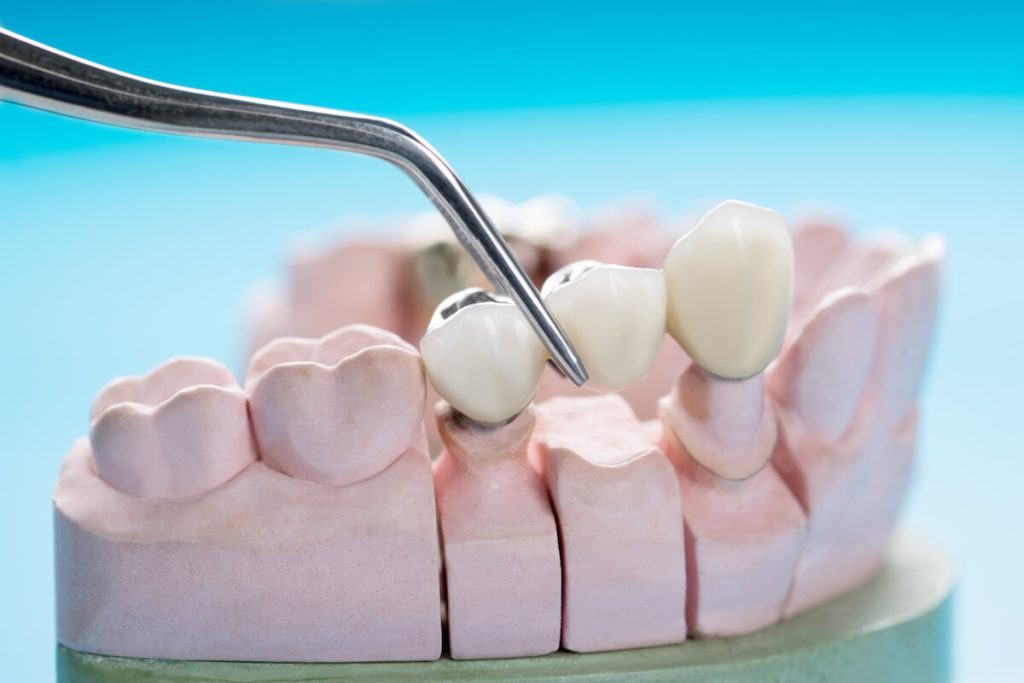How Long Do Crowns and Bridges Last? Tips for Longevity

If you’ve had dental crowns or bridges or are considering them, one question likely on your mind is, “How long will they last?” It’s a valid concern, especially when you want to maximise your investment in your dental health.
Crowns and bridges can considerably extend patients’ lives by ensuring they are aware of their lifespan and appropriately cared for.
What Are Dental Crowns and Bridges?
Dental Crowns
A crown is a covering or cap cemented onto a tooth that has been broken, decayed, or weakened.
It recreates the tooth’s shape, size, strength, and appearance. It can be made from ceramic, metal, porcelain, or a combination.
They are explicitly designed to be placed over your tooth to act as the tooth and simultaneously have the appearance.
Dental Bridges
A dental bridge fills a space resulting from one or more missing teeth.
It typically consists of one or more artificial teeth, known as pontics, anchored by crowns on the adjacent healthy teeth.
The result is a natural smile that works just like your natural teeth.
How Long Do Crowns and Bridges Last?
The longevity of dental crowns and bridges varies according to several factors, such as the type of material used, the standard of dental care, and the level of maintenance.
On average:
- Crowns usually live between 10 and 15 years, but if they are well cared for, they can live 20 years or more.
- Bridges generally last between 5 to 15 years, though some can last longer with diligent care.
These are general estimates, and individual experiences may vary. Understanding the elements that determine crown and bridge longevity might help you extend their lifespan.
Factors Influencing the Longevity of Crowns and Bridges
Material Quality
The type of material used for your crown or bridge significantly impacts its durability.
Porcelain and ceramic crowns offer excellent aesthetics but may wear down faster than metal or porcelain-fused-to-metal (PFM) crowns.
While not as visually appealing, metal crowns are incredibly durable and often last longer.
Bridges typically use similar materials, and your dentist should discuss the choice between aesthetics and durability based on your specific needs.
Placement Location
The location of the crown or bridge in your mouth also affects its longevity.
Teeth in the back of your mouth endure more pressure from chewing and grinding, which can wear down crowns and bridges faster than those placed on front teeth.
Your oral habits are crucial in determining the longevity of your crowns and bridges.
Your dental work will suffer early wear and damage if you clench, grind, chew ice, or use your teeth as tools to open items.
Oral Hygiene
Just like natural teeth, crowns and bridges require regular care to stay in good condition.
Plaque and tartar can accumulate around the edges of crowns and bridges, leading to decay of the underlying teeth or gum disease, compromising the longevity of your restorations.
Quality of Dental Work
Your dentist’s skill and the quality of the dental work are also essential factors.
Well-crafted crowns and bridges that fit correctly and align with your bite will likely last longer.
Poorly fitted crowns or bridges can lead to discomfort, decay, or even restoration failure.
Overall Health
Your overall health, particularly your gums and bones, contributes significantly to the longevity of your crowns and bridges.
Conditions like gum disease can undermine the support for these restorations, leading to potential complications.
Tips for Extending the Life of Your Crowns and Bridges
While the lifespan of crowns and bridges can vary, you can take several proactive steps to extend your life and keep your smile looking its best.
#1. Practise Good Oral Hygiene
Maintaining your crowns and bridges over time requires good dental hygiene, the cornerstone of a healthy mouth.
Here’s what you should do:
- Brush Twice Daily: Brush your teeth, including any crowns or bridges, with fluoride toothpaste and a soft toothbrush twice a day. Pay particular attention to the gum line, as plaque accumulates there.
- Floss Daily: Flossing is necessary to remove food particles and plaque between your bridges, crowns, and teeth. Clean under the pontic using an interdental brush or floss threader if you have a bridge.
- Rinse with Mouthwash: Antimicrobial mouthwashes help lessen the chance of gum disease and decay, which could jeopardise your restorations, by reducing germs in your mouth.
#2. Protect Against Teeth Grinding
Bruxism, or teeth grinding, can drastically reduce the life of your bridges and crowns.
If you’re prone to grinding your teeth, especially at night, talk to your dentist about getting a custom night guard.
This appliance can protect your restorations from the excessive grinding forces, helping preserve them for years.
#3. Avoid Hard Foods and Bad Habits
Certain foods and habits can put undue stress on your crowns and bridges, leading to cracks, chips, or loosening.
To protect your dental work:
- Avoid Chewing Hard Foods: Avoid chewing on hard foods like ice, nuts, or candies, as this can damage your crowns and bridges.
- Break Bad Habits: It’s time to quit if you use your teeth to open packages, bite your nails, or chew pencils. These habits can lead to the premature failure of your dental work.
#4. Regular Dental Check-Ups
It’s essential to schedule routine dental exams to keep your bridges and crowns in good condition.
During these appointments, your dentist can:
- Examine the Fit: Ensure that your crowns and bridges still fit correctly and aren’t causing any issues with your bite.
- Check for Wear and Tear: Identify any signs of wear, damage, or decay that could compromise the longevity of your restorations.
- Professional Cleaning: A professional cleaning keeps your mouth healthy and lowers the risk of issues by removing plaque and tartar that your regular brushing and flossing may miss.
#5. Maintain Healthy Gums
A good smile is built on strong gums, which are also essential to the durability of crowns and bridges.
To keep your gums in good shape:
- Practise Good Oral Hygiene. Brushing and flossing are crucial for preventing periodontal disease.
- Quit Smoking: Your crowns and bridges may eventually fail as a result of gum disease, which is significantly increased by smoking. If you smoke, consider quitting to protect your dental health.
- Watch for Signs of Periodontal Disease: Gums that are red, swollen, or bleeding are indicators of gum disease. If you notice any of these symptoms, see your dentist immediately for an evaluation.
When to Replace Your Crowns and Bridges
Even with the best care, crowns and bridges may eventually need to be replaced.
Understanding the apparent indicators that it’s time for a replacement is crucial.
- Visible Wear and Tear: See your Melbourne CBD dentist if your crown or bridge has any chips, cracks, or other problems. Even tiny cracks can weaken the restoration and lead to further issues.
- Discomfort or Pain: Pain, discomfort, or sensitivity around a crown or bridge could indicate a loose fit, decay, or other underlying problem.
- Receding Gums: If your gums recede around a crown or bridge, it may expose the underlying tooth or metal, compromising the restoration’s appearance and function.
- Aesthetics: Over time, the appearance of your crown or bridge may change due to wear or discolouration. If you’re unhappy with its appearance, a replacement can restore your smile’s appearance.
Your smile is one of your most valuable assets, and taking care of your crowns and bridges is an investment in your long-term dental health.
You can contribute to ensuring that your crowns and bridges endure as long as possible by being aware of the elements affecting their longevity and heeding the advice above.
Regular dental visits, good oral hygiene, and protective measures like wearing a night guard are vital to maintaining a beautiful smile.
Crowns and Bridges Management in Melbourne CBD
Don’t wait until there’s a problem—schedule your next dental check-up today to ensure your crowns and bridges are in top shape.
Your Melbourne CBD dentist can help you avoid potential issues, keeping your smile strong and beautiful for years.
At Art De Dente Melbourne CBD, we prioritise your comfort and deliver a positive experience throughout your visit.
Whether you’re due for a routine cleaning or have concerns about your existing dental work, now is the perfect time to take action.
Call us today at (03) 9642 8955 to book your appointment and take the first step toward preserving your smile’s health and longevity.
Visit us at Level 17, 190 Queen Street in Melbourne CBD.

